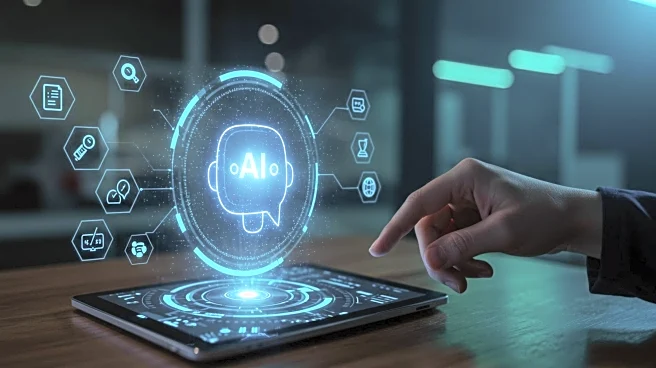What's Happening?
Educators are increasingly turning to AI chatbots, such as ChatGPT, to create more engaging and interactive assignments for students. These advanced language models assist teachers in developing assignments that not only meet educational standards but also captivate students' interest. By using AI, teachers can brainstorm and refine ideas, resulting in assignments that encourage students to interact with digital media in meaningful ways. For instance, a college professor used ChatGPT to design a media literacy assignment that involved students analyzing and interacting with media content, rather than writing traditional essays. This approach aims to make learning more enjoyable and impactful for students, while also easing the grading process for educators.
Why It's Important?
The integration of AI in education represents a significant shift in teaching methodologies, potentially transforming how students engage with learning materials. By leveraging AI, educators can create assignments that are not only educational but also enjoyable, fostering a more dynamic learning environment. This shift could lead to improved student outcomes, as engaging assignments are more likely to inspire and motivate students. Additionally, AI-driven assignments can help develop critical thinking and media literacy skills, which are essential in today's digital age. The use of AI in education also highlights the growing importance of technology in shaping future educational practices and policies.
What's Next?
As AI continues to evolve, its role in education is expected to expand further. Educators may increasingly rely on AI tools to personalize learning experiences, catering to individual student needs and learning styles. This could lead to more adaptive and customized educational content, enhancing the overall learning experience. Furthermore, the success of AI-driven assignments may prompt educational institutions to invest more in AI technologies, integrating them into curricula and teacher training programs. The ongoing development of AI in education will likely spark discussions about ethical considerations, data privacy, and the balance between technology and traditional teaching methods.
Beyond the Headlines
The use of AI in education raises important ethical and cultural questions. As AI tools become more prevalent, educators and policymakers must consider issues such as data privacy, the potential for bias in AI algorithms, and the impact on teacher-student interactions. Additionally, the reliance on AI could shift the educational landscape, potentially reducing the emphasis on traditional teaching methods and human interaction. These developments may require a reevaluation of educational values and priorities, ensuring that technology enhances rather than detracts from the learning experience.










